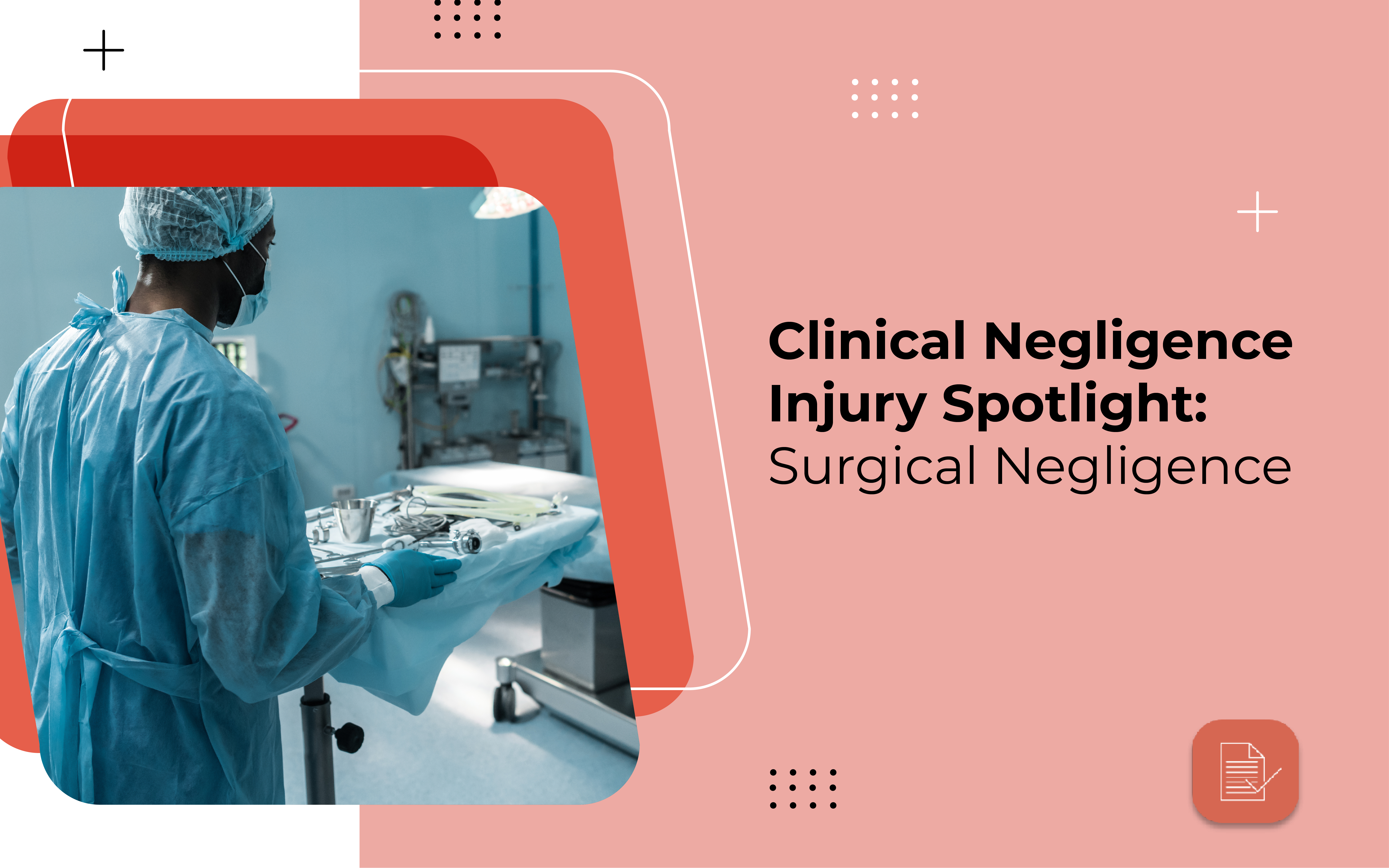
12 Oct 2023
Clinical Negligence Spotlight: Surgical Negligence
Whilst surgical injuries can range from minor to severe, surgical negligence claims are quite rare in the UK, with just 1% of all operations resulting in a claim. Of course, this doesn’t mean things don’t go wrong, and with the NHS under increasing pressures, it’s important to raise awareness of what surgical negligence is, why it happens and what the implications can be.
What is surgical negligence?
In legal terms, the definition of surgical negligence is the physical or psychological harm caused by the human error of a medical professional.
There could be many reasons for this, from improper training or wrong diagnosis, to operating on the wrong leg or, more commonly, injuring a nerve or artery. Though not all mistakes amount to negligent surgical treatment; only those where a surgeon’s care has fallen below a reasonable standard are likely to lead to a successful surgical negligence claim.
The key thing to remember with all surgical negligence cases is to recognise that, following most operations, a patient will typically experience some pain, discomfort, and distress whilst they recover. They may even have some swelling, fluid leakage, redness and limited mobility in the area operated on, particularly if the surgical procedure was extensive and took place over several hours.
Potential symptoms such as these should have been clearly explained by the surgeon before the surgery took place, though if a patient suffers different symptoms, or if their symptoms continue for a long time, it may be because of a surgical error.
What constitutes surgical negligence?
Whilst there are inherent risks involved with most surgical procedures, a surgical error is any kind of mistake that is made during an operation that causes a patient harm.
The most common surgical negligence cases are related to errors such as:
- Performing the wrong type of operation
- Wrong-site surgery, such as amputating the wrong limb or operating on the wrong part of the body
- Leaving a foreign object, such as a surgical instrument, inside of the patient
- Improper sterilisation of instruments leading to infection
- Causing nerve damage, or damage to organs, during surgery
- Improperly executed surgeries
- Excessive or unexpected scarring
- Infections received
- Anaesthetic complications
- Performing operations unnecessarily
- Delays to surgery
- Organ perforation; or
- Failing to sterilise instruments which lead to an infection
What affect would surgical negligence have on someone’s life?
Whilst most surgeries carried out in the UK do run without any complications and can greatly improve a patient’s quality of life, occasionally, surgical errors are made which can have a devastating impact.
These mistakes have the potential for a patient to develop new health issues that they did not experience prior to having the surgery, or which worsen as a result of the surgery, and can lead to long-term conditions, chronic pain or in some cases, even death.
There are, however, risks involved with every type of surgery, and the patient should always be made aware of such risks prior to consenting to their operation.
If the surgeon or hospital is found to have acted negligently, which results in injury, complications, or infection to the patient, then they may be able to make a medical negligence claim.
How can surgical negligence be prevented?
Surgical errors can be prevented by having stringent checks on all patient records, such as checking that the surgeon is operating on the right area and all instruments have been appropriately sterilised.
Likewise, surgeons should always properly communicate with their patient’s doctors, ensure that no delays to surgeries are expected and be diligent with their record-keeping for all surgeries.
What’s more, having a physician read back procedure notes can also help surgeons prevent life-changing physical harm, and gives another opinion of whether the surgeon is fit to proceed.
How Speed Medical can help
Utilising our in-house medical and legal expertise, and by assigning a dedicated case handler to each client, Speed Medical has been delivering a unique reporting service for all clinical negligence cases and services for over 24 years.
Our clinical negligence reporting service is delivered through a nationwide panel of over 2,000 credible experts and is further supported by both our Clinical Advisory Board and dedicated case handlers, all developed and overseen by our in-house clinical negligence lawyer.
What’s more, our transparent pricing structure allows us to provide deferred payment terms as part of an industry leading approach. This includes our case handlers providing the CV's of up to 3 medical experts along with their estimated fees and turnaround times, within 5 working days of being instructed, as well as an expanded service which includes 2 levels of fixed fee preliminary screening reports, from any expert specialty; a service which has been created to enable solicitors to determine the viability of a case from the outset, without significant financial investment.
All of this combined makes Speed Medical the ideal choice for solicitors looking to instruct an established, leading provider of medical assessments, medical treatment, and medical reports.
If you’d like to talk to us about any of our services, please get in touch with our friendly team who will be happy to talk to you.






